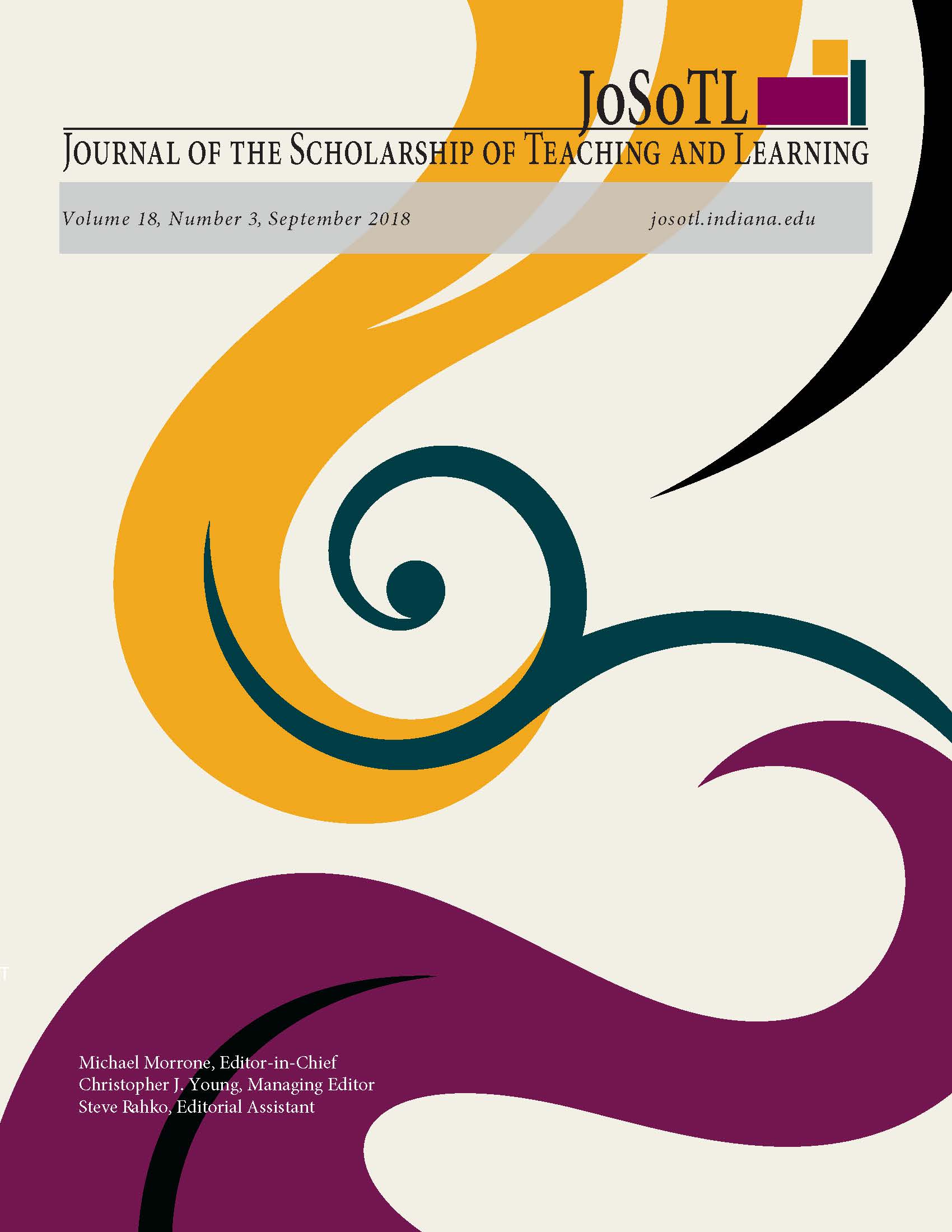Promoting Long-lasting Learning Through Instructional Design
Main Article Content
Abstract
Downloads
Article Details
- Authors retain copyright and grant the Journal of the Scholarship of Teaching and Learning (JoSoTL) right of first publication with the work simultaneously licensed under a Creative Commons Attribution License, (CC-BY) 4.0 International, allowing others to share the work with proper acknowledgement and citation of the work's authorship and initial publication in the Journal of the Scholarship of Teaching and Learning.
- Authors are able to enter separate, additional contractual agreements for the non-exclusive distribution of the journal's published version of the work (e.g., post it to an institutional repository or publish it in a book), with an acknowledgement of its initial publication in the Journal of the Scholarship of Teaching and Learning.
- In pursuit of manuscripts of the highest quality, multiple opportunities for mentoring, and greater reach and citation of JoSoTL publications, JoSoTL encourages authors to share their drafts to seek feedback from relevant communities unless the manuscript is already under review or in the publication queue after being accepted. In other words, to be eligible for publication in JoSoTL, manuscripts should not be shared publicly (e.g., online), while under review (after being initially submitted, or after being revised and resubmitted for reconsideration), or upon notice of acceptance and before publication. Once published, authors are strongly encouraged to share the published version widely, with an acknowledgement of its initial publication in the Journal of the Scholarship of Teaching and Learning.
References
Anderson, L. W., Krathwohl, D. R. and Bloom, B. S. (2001). A taxonomy for learning, teaching, and assessing: A revision of Bloom's taxonomy of educational objectives. Boston, MA: Allyn & Bacon
Baddeley, A. (2010). Working memory. Current Biology, 20(4), R136-R140.
Bligh, A. B. (2000). What’s the use of lectures? San Francisco, CA: Jossey-Bass
Brame, C. J. and Biel, R. (2015). Test-enhanced learning: The potential for testing to promote greater learning in undergraduate science courses. CBE—Life Sciences Education, 14, 1-12.
Brown, P. C., Roediger, H. L. and McDaniel, M.A. (2014). Make it stick. Harvard University Press.
Carey, B. (2014). How We Learn: The Surprising Truth about When, where and why it Happens. Pan Macmillan.
Chandler, N. J. and Sweller, J. (1992). The Split-Attention Effect as a Factor in the Design of Instruction: A Review and Qualitative Synthesis. British Journal of Educational Psychology, 62(2): 233-246.
Cowan, N. (2001). The magical number 4 in short-term memory: A reconsideration of mental storage capacity. Behavioral and Brain Sciences. 24, 87-114.
Deans for Impact. (2015). The Science of Learning. Austin, TX: Deans for Impact.
Debue, N. and van de Leemput, C. (2014). What does germane load mean? An empirical contribution to the cognitive load theory. Frontiers in Psychology, 5, 1099. http://doi.org/10.3389/fpsyg.2014.01099
DeWinstanley, P. A. and Bjork, R.A. (2002). Successful lecturing: Presenting information in ways that engage effective processing. New Directions for Teaching and Learning, 2002(89), 1931.
De Jong, T. (2010). Cognitive load theory, educational research, and instructional design: Some food for thought. Instructional Science, 38: 105-134.
Fink, L. D. (2003). Creating significant learning experiences: An integrated approach to designing college courses. San Francisco, CA: Jossey-Bass
Karpicke, J. D. and Grimaldi, P.J. (2012). Retrieval-based learning: A perspective for enhancing meaningful learning. Educational Psychology Review, 24(3), 401-418.
Karpicke, J. D. and Roediger, H.L. (2008). The critical importance of retrieval for learning. Science, 319(5865), 966-968.
Karpicke, J. D. and Roediger, H.L. (2007). Expanding retrieval practice promotes short-term retention, but equally spaced retrieval enhances long-term retention. Journal of Experimental Psychology: Learning, Memory, and Cognition, 33(4), 704.
Kirschner, P.A., Sweller, J. and Clark, R.E. (2006). Why Minimal Guidance During Instruction Does Not Work: An Analysis of the Failure of Constructivist, Discovery, Problem-Based, Experiential, and Inquiry-Based Teaching. Educational Psychologist, 41(2), 75-86.
Lang, J. M. (2016). Small Teaching. San Francisco, CA: Jossey-Bass.
Lowe, D. (2016). Remembrance of Philosophy Classes Past: Why Cognitive Science Suggests that a Brief Recap Is the Best Way to Start Each Class Day. Teaching Philosophy, 39(3), 279289.
Lyle, K. B. and Crawford, N.A. (2011). Retrieving essential material at the end of lectures improves performance on statistics exams. Teaching of Psychology, 38(2), 94-97.
Mayer, R.E. (2004). Should there be a three-strike rule against pure discovery learning? American psychologist, 59(1), 14.
McGuire, S. Y. (2015). Teach Students how to Learn: Strategies You Can Incorporate Into Any Course to Improve Student Metacognition, Study Skills, and Motivation. Stylus Publishing, LLC.
Miller, G. A. (1956). The magical number seven, plus or minus two: Some limits on our capacity for processing information. Psychological Review, 63: 81-97.
Moreno, R. (2006) Learning in High-Tech and Multimedia Environments. Current Directions in Psychological Science. 15(2): 63-67.
Pashler, H., Bain, P. M., Bottge, B. A., Graesser, A., Koedinger, K., McDaniel, M. and Metcalfe, J. (2007). Organizing Instruction and Study to Improve Student Learning. IES Practice Guide. NCER 2007-2004. National Center for Education Research.
Pashler, H., Rohrer, D., Cepeda, N. J. and Carpenter, S.K. (2007). Enhancing learning and retarding forgetting: Choices and consequences. Psychonomic bulletin & review, 14(2), 187-193.
Peterson, L. and Peterson, M. (1959). Short-term Retention of Individual Verbal Items. Journal of Experimental Psychology. 58, 193-198.
Roediger, H. L. and Butler, A.C. (2011). The critical role of retrieval practice in long-term retention. Trends in cognitive sciences, 15(1), 20-27.
Roediger, H. L. and Karpicke, J.D. (2006). Test-enhanced learning taking memory tests improves long-term retention. Psychological science, 17(3), 249-255.
Storm, B. C., Bjork, R. A. and Storm, J.C. (2010). Optimizing retrieval as a learning event: When and why expanding retrieval practice enhances long-term retention. Memory & Cognition, 38(2), 244-253.
Sweller, J. (1988). Cognitive Load During Problem Solving: Effects on Learning. Cognitive Science, 12, 257-285.
Sweller, J. (1994). Cognitive Load Theory, Learning Difficulty, and Instructional Design.
Learning and Instruction, 4: 295-312.
Wiggins, G. and McTighe, J. (2001). What is Backward Design? In G. Wiggins & J. McTighe’s Understanding by Design (p. 7 – 19). Upper Saddle River, NJ: Prentice Hall.
Zull, J.E. (2002). The Art of Changing the Brain: Enriching Teaching by Exploring the Biology of Learning, Virginia: Stylus Publishing.
